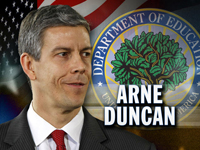 From the Journal Star:
From the Journal Star:
Mayor Jim Ardis said U.S. Secretary of Education Arne Duncan is pledging his department’s assistance to help Peoria turn around its schools…. Ardis, along with Lee Graves, CEO and president of ELM Group, and former state Sen. George Shadid made a whirlwind visit to Washington, D.C., this week, meeting with Duncan, a former CEO of Chicago Public Schools who once served under CEO Paul Vallas….
There’s no easy answer, Ardis admitted, noting that Duncan believed it will take a combination of Race to the Top, strong emphasis on charter schools and performance-based teaching as well as more municipal involvement to get poorly performing school districts headed in the right direction….
Ardis said he wanted to find out what’s available and what Duncan would recommend for improving school performance.
“We haven’t seen any movement by this board or past boards to go out on their own initiative to speak to with the secretary of education, or anyone else,” he said.
A couple things about this story:
First, kudos to Mayor Ardis for taking initiative and doing what he can to help District 150. It’s unfortunate that his past efforts (to bring in Paul Vallas for some consulting advice) have been rebuffed by District 150 administrators and board members. The district should be welcoming the mayor’s overtures.
Second, Secretary Duncan’s reported response is interesting: “…it will take a combination of Race to the Top [additional federal funds allocated to school districts through state governors], strong emphasis on charter schools and performance-based teaching [emphasis added] as well as more municipal involvement to get poorly performing school districts headed in the right direction….” Doesn’t this sound like the Secretary is implicitly suggesting union-busting? Performance-based teaching is a repudiation of the tenure system, and charter schools can hire teachers who are not union represented.
Well, as it turns out, teachers are catching the same vibe. In a speech to the National Education Association (NEA) in July, Education Week reported that Duncan said “[t]eachers’ unions must be willing to reconsider seniority provisions, rework tenure provisions, and work with districts to create fair ways of incorporating student-achievement growth in teacher evaluation and compensation.” As you might expect, this wasn’t well-received by teachers:
Delegates applauded Mr. Duncan’s calls for continued federal funding for education, better training for administrators, and for improved teacher-mentoring experiences. But in an indication of the challenges that the federal government will face as it pushes for reforms to compensation and evaluation, they booed and hissed through those parts of Mr. Duncan’s address.
Booed and hissed! And here I thought incivility was invented by Rep. Joe Wilson just a few weeks ago. Imagine teachers booing and hissing (the hissing is what really gets me) the Secretary of Education during a speech. One more quote from the Education Week article: “‘Quite frankly, merit pay is union-busting,’ said another delegate, to applause from her peers.”
So, my guess is that District 150 will have a similar reaction. They will likely embrace efforts to capture more federal dollars through the Race to the Top Fund, but efforts to implement performance-based teaching initiatives will be rebuffed in teacher contract negotiations. Realistically, that would mean Peoria would receive no benefit because the Race to the Top dollars are tied to just the kinds of reforms teachers unions find objectionable. As for charter schools, the only one proposed recently — the Math, Science, and Technology Academy — has yet to have its charter authorized by District 150.
However, teachers will be happy to hear that Duncan is no fan of No Child Left Behind. Here’s his assessment, according to a recent report from ABC News:
“It unfairly labeled many schools as failures even when they were making progress,” he said. “It places too much emphasis on raw test scores rather than student growth. And it is overly prescriptive in some ways while it is too blunt an instrument of reform in others.
“But the biggest problem with NCLB,” he added, “is that it doesn’t encourage high learning standards. In fact, it inadvertently encourages states to lower them. The net effect is that we are lying to children and parents by telling kids they are succeeding when they are not.”
That’s certainly been true in District 150, as recent changes to the district’s grading scale can attest.

 From the
From the ![Ardis-Jim-Color[1] Ardis-Jim-Color[1]](https://peoriachronicle.com/wp-content/uploads/2009/07/Ardis-Jim-Color1.jpg)